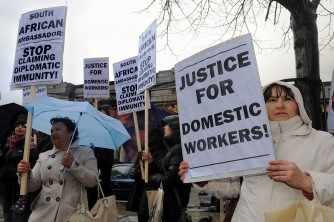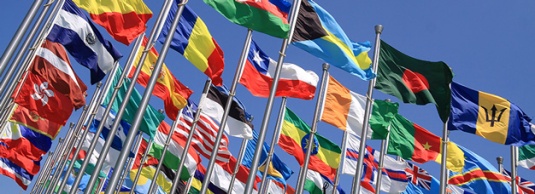Almost a year ago, D evyani Khobragade was indicted by U.S. authorities for abuse of her domestic employee, Sangeeta Richard. Although her case made international headlines and caused diplomatic stress between the United States and India, it quickly fell into the background without investigation. And while her case is important for the media to give attention to, it is only one of countless others like it that never see justice.
evyani Khobragade was indicted by U.S. authorities for abuse of her domestic employee, Sangeeta Richard. Although her case made international headlines and caused diplomatic stress between the United States and India, it quickly fell into the background without investigation. And while her case is important for the media to give attention to, it is only one of countless others like it that never see justice.
Many of the domestic workers that Break the Chain works with have A-3 or G-5 visas, meaning they are in the U.S. to work for foreign diplomatic personnel. These visas are for domestic employees who are accompanying an employer who is visiting or on temporary assignment in the United States, and require a written contract in the employee’s native language for negotiating fair wages and a suitable living situation.
The kinds of abuse exposed in the Khobragade case are very familiar to our project. For example, in a snapshot of cases in 2003, BTCC was working on or had completed intakes for 28 individual cases of foreign domestic workers, originating from many places in Africa, South America, and Southeast Asia, and who were facing abuse in the United States. Many of the cases involved ambassadors, diplomats, and World Bank employees who paid little to nothing for the workers’ labor and often physically abused them. One report gave the story of an Indian woman working for a World Bank family 16 to 18 hours a day for 18 cents an hour and facing beatings. Another case showed a Uruguayan man brought over by a diplomat who paid below minimum wage, refused to allow him out of the house, and had him sleep in a laundry closet. These cases are not as few and far between as we would hope, rather they are kept quiet.
The cases represented in the media are the seemingly successful ones: ones who have filed legal action, ones who have the resources to stand up and demand better treatment. There are countless others who slip through the cracks- whether it’s because the severity of their abuse is so traumatizing that they can’t speak out, or because law enforcement did not take on their case, or because service providers or outreach efforts simply didn’t reach them to educate them about options.
But we must also ask, what is justice for an abused domestic worker? What is accountability for an abusive foreign diplomat? Not one case has resulted in conviction for the abuser.
Not only should the United States government be holding foreign diplomats accountable, but the abusers’ home countries should take action as well. In a 2012 C-SPAN interview, Luis CdeBaca, outgoing United States Ambassador in the Office to Monitor and Combat Trafficking in Persons, suggested that other countries should be exercising extraterritorial jurisdiction. Ambassador CdeBaca urged that as a global community, “we should be able to prosecute our citizens if they enslave someone overseas, especially if they are there under government orders.” Because of the nature of foreign domestic work in homes of foreign diplomats, offenders are in-between legal accountability, and reputations are at risk in diplomacy.
The TVPA has protocol in place for dealing with these cases, but it goes unenforced. The Trafficking Victims Protection Reauthorization Act of 2008 requires the Secretary of State to suspend countries from the special visa program if there is credible evidence of abuse of domestic workers.
Beyond response, workers and advocates are also looking to prevention. It is here where we see some possible movement: First, improving pre-departure education activities so that domestic workers are not only aware of their rights, but are able to connect to NGO groups and resources to exercise those rights. Another area we see potentially moving is closer monitoring of working conditions by the State Department- in the form of individual in-person meetings with workers after they have arrived and started working. Advocates and survivors have a lot to add about exactly how these prevention projects can be most effective- but absent strong prosecutions, waivers of immunity, and suspensions of violating countries- it’s the least that can be done.
Becca Lamb, Intern
Break the Chain Campaign
